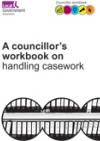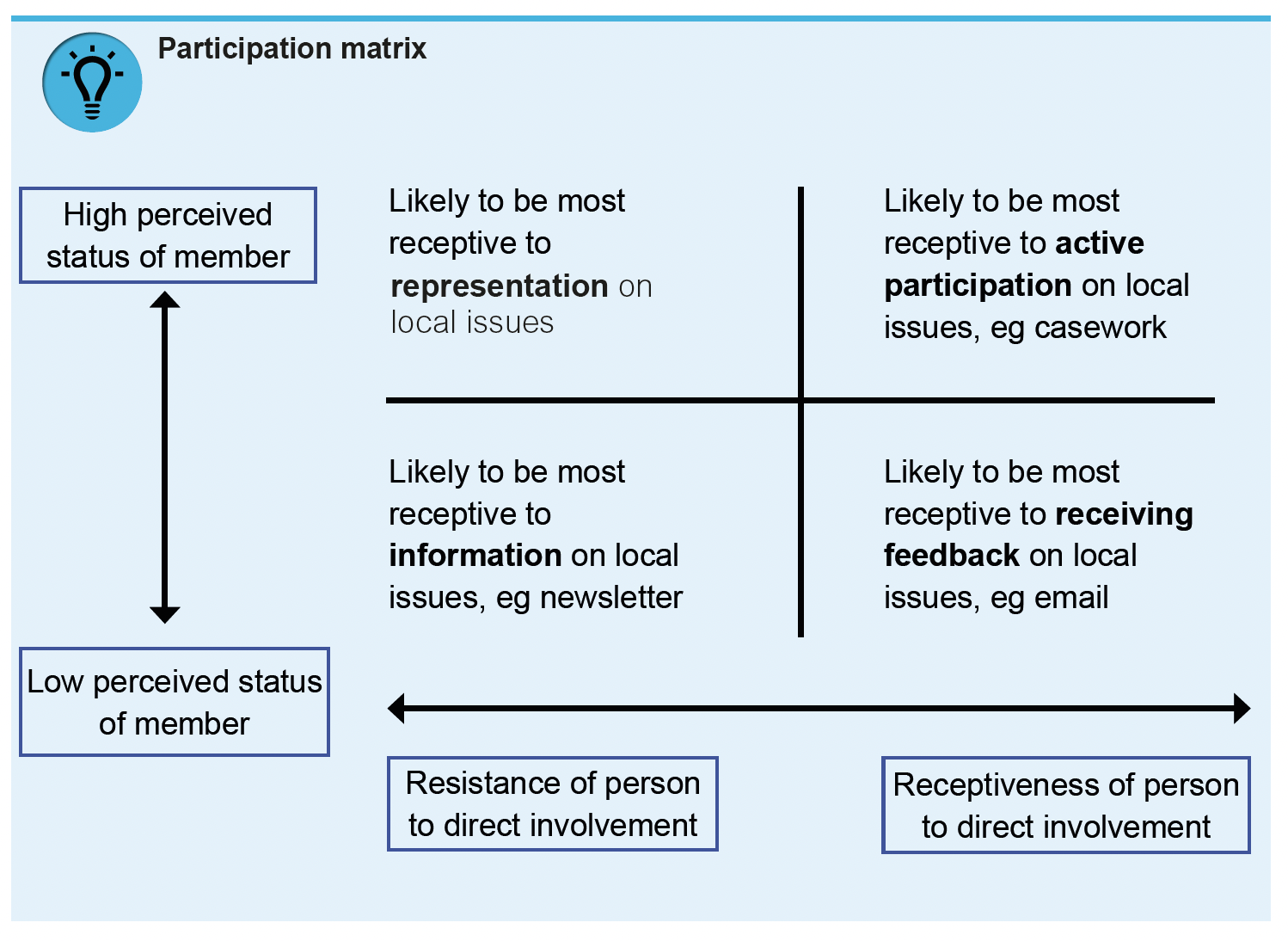Dealing with casework will require you to develop your own simple, but effective, ways of managing both the information and ‘paper’ flow. If you have been a councillor for some time, you have probably developed systems for doing this by default, i.e., finding out, by trial and error, what works well for you and what doesn’t.
Some councils have begun to explore the use of technology-based solutions to help councillors – so-called e-Casework systems. But sensible use of the equipment you already have available in your home or office and an efficient paper-based record system will serve just as well. Good note-keeping and diary management are essential, as well as a good filing system.
For those councillors that like to make use of technology, spreadsheets and databases can help to store, search, and retrieve details of individual cases, alongside the use of email as an essential communication tool. It is also worth noting that many electoral rolls are now available electronically, offering you the possibility of being able to merge this information with a proprietary data management system to cut down on the time required to search for people’s names and addresses.
Whatever your preferred approach and regardless of the systems you employ, there will be a number of general steps that you will need to take in handling the casework you generate. These are discussed in the sections below.
Three tips for dealing with casework
Install a dedicated telephone line – use an answering machine or service for calls outside of normal hours.
Use a simple form to capture the key facts about each case, i.e., names, addresses, contact details, casework history, others involved etc.
Make a record of all calls, conversations and action taken – it doesn’t have to be onerous; a simple diary ‘log’ is usually sufficient.
Handling casework in a digital environment
The use of information and communications technology can also assist councillors by enabling residents to send electronic documents and photographic evidence relevant to some casework situations, e.g., it is not uncommon for residents to send councillors digital photographs of potholes in the road or community sites that have been blighted by vandalism.
Like many people, a growing number of councillors are finding that the use of social media tools like Facebook, whatsapp and Twitter is helping them to raise their profile and build engagement with their residents. While blogging/vlogging, emailing and the use of social media may not be every councillor’s preferred route for generating casework, it is likely that some people who might be unwilling or unable to attend an advice surgery may prefer the ease and comfort of corresponding with their ward councillor from their own home and at a time that suits them.
As with any work a councillor does it is an ever-changing landscape. In the context of large cuts to local government financing as well as councillors working harder than ever before to make sure their communities are represented casework too has changed. Broadly speaking councillors received queries from the residents via telephone, letters, or ward surgeries; this was certainly still very much the case in 2011 when I first became a councillor.
Recently we have seen a channel shift towards emails and social media with it being much less common now to receive a letter or surgery request. As times change, we are receiving more enquiries through social media, sometimes in a direct message through Facebook, whatsapp or Twitter, these are what I refer to as reactive inquiries. A resident asks you for advice or help and you react. The other way to engage with residents is if you keep an eye on some of your local community groups on Facebook. There will sometime be queries or complaints about how the council has taken a decision or a concern about their personal situation; If you can support them, why not pop on a post advising that you can help and ask them to call or private message you. This is how I proactively seek to help residents where possible.
The final important principle of handling casework is never promise what you cannot deliver. Managing expectations is now essential, whether that be how long it will take to get back to a constituent with a response or what and can be done due to financial or legal restraints. If we cannot help the resident in the way, they wish is there an alternative and if not explain why something cannot be done. Never offer advice that you are unsure is accurate, if you do not know the answer to a query just explain you need further clarity on the matter before giving a response. Most people appreciate honesty from their councillor and are happy to work with you within the constraints of local government if you explain this to them from the outset.
Challenge 2 – the casework challenge
Think about the systems you employ for handling casework. Write down how you would find out the following information about the cases you have dealt with in the past year:
- The proportion of cases successfully resolved.
- The number of people under thirty that have contacted you with casework queries.
Look again at what you have written. Could you make any changes to the systems you employ to enable you to extract this and other useful information more readily?
Identify what the problem is
You will need to establish the facts and find out how your constituent wants you to help. This will include identifying whether there is a long history to the problem and who has been approached in the past. It is worth approaching each case with a degree of humility – some residents with evidence of failure by ‘the council’ may see you as their last resort and some may be angry about the way they have been treated.
Avoid promising to sort out every problem but do offer a sympathetic ear. While you can use your knowledge, contacts, and advocacy skills to assist people, it is best to try and get people to help themselves. And keep the discussion focused on solutions and what can be done, rather than looking for scapegoats and people to blame.
Your residents will be looking for support, but they will be looking for answers and solutions even more. Understanding the nature and scale of the problem presented will often require you to use your judgement. Some people may try to use you or may avoid telling you everything you need to know. Before you can assist, you need to get all the relevant facts and information.
Refer the problem to the appropriate council department
Having identified what the problem is, you should communicate with the council officers who handle councillors’ enquiries or relevant service officers, if that is how your council operates. You may want to put your concerns or questions in writing, although most councillors find that a quick face to face discussion, telephone call or email is quicker and easier in sorting out casework problems.
Remember also to give clear instructions to the council officers, either to write to your constituent with a copy for you, or to work through you. Do not leave them to decide which approach you favour. And remember to copy the constituent in on what you have sent to officers unless it is confidential.
The LGA’s workbook on Handling complaints for service improvement, written in partnership with the Local Government Ombudsman, will provide you with useful information on what matters should be dealt with by you directly and what should be referred on to other agencies such as government departments or statutory bodies.
Get in the habit of taking copies of all correspondence and treat your residents’ affairs with appropriate confidentiality, i.e., always ask permission before sharing their information or views with a third party and take steps to protect the information you store about them. If you are in any doubt about your legal responsibilities regarding data protection, speak to your council’s legal department.
Casework – dealing with anger
People who approach members about serious or intractable problems can often be stressed or angry. Remember:
- be polite and assertive but never aggressive – this will only increase the tension
- do not promise more than you can deliver – this will create problems in the long run
- avoid taking personal responsibility for a problem − the blame and hostility may shift on to you
- approach the council if you need help or training in dealing with awkward customers
- do not respond to racist, sexist, or offensive remarks – draw the discussion to a close.
Challenge 3 – the casework challenge
Consider the following casework example. Write down the steps you might take to tackle the issues presented:
The Oaks is a council estate in your ward. It was built in the 1960s and is made up of three streets arranged in a horseshoe, down the centre of which run some old garages which were originally designed for residents’ use. The estate gets its name from the woodland which once covered the site. You have been approached by Mrs Dyer, an elderly constituent on the estate, who wants the council to take some action to tackle her concerns. You already know that parts of the estate are run down and can look untidy. You are now being told that the garages on The Oaks have become a ‘no go’ area for local people. Cars are apparently being abandoned on a regular basis and the empty garages have become a haven for groups of teenagers who create noise and havoc into the night. She also tells you that the buildings are being used for drug dealing and storing stolen cars.
Look again at the ideas you have written down. To what extent have you rushed into a list of possible ‘solutions’ to the problems presented before checking out the relevant facts?
If the problems presented are widespread, you might expect to have received comments or complaints from other residents. Could you speak to others on the estate, of different ages, to get a more balanced view? If the alleged cases of noise, drug taking and vehicle abandonment are a reality, isn’t it likely that the council or other partner agencies (e.g., the police) will have some evidence for this? It may be that Mrs Dyer is correct in her assessment and that action is needed to tackle a growing community problem, but some early legwork and a few reality checks might help to strengthen your understanding of what is really going on.


